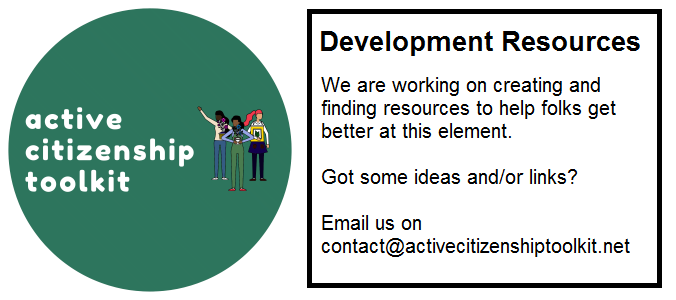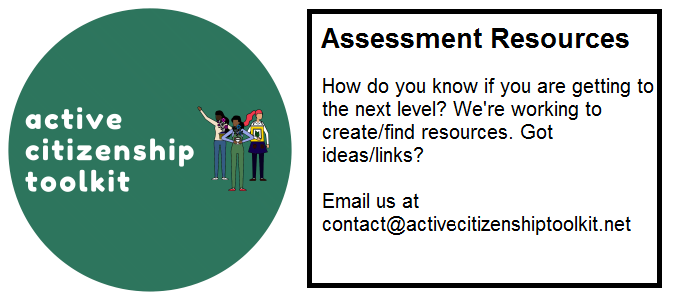Element Descriptor
Any public meeting or forum runs the risk of attracting people with particular perspectives and fixed ideas that they are overwhelmingly keen to communicate to others. Making sure that they are heard but do not stop others from participating, making decisions and returning to future meetings/events is a crucial skill. Failing to protect space will mean it becomes colonised and unattractive to, well, pretty much everyone.
Level descriptors
| Novice | Practitioner | Expert | Ninja |
|---|---|---|---|
| You are able to deal with people of , ah, fixed opinions, who think that they can simply turn up, take over the group and get everyone selling newspapers in half an hour. Or turn it into a sub-cult, simply by saying the Key Words over and over, louder and louder | You are able to deal with a small number of disruptive people who won’t take ‘you’ve had your turn/you’re not holding the conch’ for an answer. It may get bloody and nasty, but in the end you have the understanding of their behaviours, which you can explain, to defeat them without the victory being Pyrrhic. | You are able to defend a functioning and cohesive group from a disruption attempts by determined and experienced disruptors for whom vampiring your group is a matter of (their) life and death. You can explain and counteract their various tactics with wit, warmth and compassion leading them to give up and find a softer target. | People who have a shaky grasp on reality know enough to not bother bringing their latest topics to your group, because they will get a fair hearing, but not be able to disrupt or takeover the agenda. |
Element Overview Essay
This is a draft. If something doesn’t make sense, or you see typos, or if you have further ideas, please email us on contact@activecitizenshiptoolkit.net
So, any social movement organisation is going to experience some kind of disruption from disruptive people. Now, this element is not about dealing with Cointelpro style stuff where state or state and corporate interests are trying to stop you achieving what you want to achieve. That’s a totally different world of pain. Good luck. We’ll talk about another time.
No, this is about disruption from within. So any community group or issue group is going to attract people who have strong opinions and perhaps unmet emotional needs. Now. If one of them is listening to this, they will be outraged. “This is condescending. patronising. This is belittling, this is sub Freudian nonsense.” All I can say in response is in a long, long time of doing activism. I’ve seen it and you know, probably been it when you are lonely, disappointed, angry, lonely – did I mention that one? – then the attraction of being able to go along to a meeting or be part of a group where there’s a whole load of other people who, more or less tolerate you, more or less can be quite comforting.
So what do we mean by disruption? That does NOT mean asking awkward questions. The people in charge may find that disrupting. But if you are asking specific, useful questions in an appropriate tone of voice, and you’re rendering the leaders of the group uncomfortable, you’re not being disruptive. What I’m talking about with disruptive is people who interrupt meetings when someone else is speaking. And the gender dynamic is real. Men interrupting women all the time. I mean, that happens anyway. And that’s not perceived as disruptive at least by most men. Women notice. Women notice. No, what I’m talking about is when meetings get sidetracked about the ongoing disagreements, personal issues get dragged in, and things just get deep. railed and become emotionally fraught and tendentious. That’s the kind of disruption I’m talking about.
So what are the consequences of this? Well, I think you need to split the consequences between the functioning of the group and the wider implications. So for the core group who care about this issue, and for some of whom it’s just part of their identity that they are active citizens on issue x or y or Zed they will be demoralised, they will be fed up, but they will persist and the disruption won’t be fatal to them.
However, there are other people in the group who are newer, who are less committed who were busier? Who are thinking of themselves? “Hell, every time I go to one of these meetings, it kicks off between person x and person y. I don’t understand the reasons. All I understand is that I don’t like it and it disrupts our ability to get anything done. And I am seriously beginning to question whether I am going to continue to devote time, energy, money, other resources, you know, my broader networks to this group.” And those people often leave. Now that has an obvious demoralising effect and on the group and lessens its ability to do stuff. But I said wider implications and there are, because those people who’ve left well, their friends say to them, “Hey, I noticed that you no longer go to the, you know longer talk about that group you were involved in ‘land rights for gay whales’. Why is that?”
And the person tells them, “it was a shit show. There are all these conflicts going on that never seem to get resolved. It’s like a festering sore. And in the end, I just thought, screw it.” Now, the people who asked that question, go, “Oh, wow. Yeah, no, it sounds sounds really bad.” And they’re thinking to themselves. “Crap. I was thinking about getting involved in land rights for gay whales,” or they’re thinking, “yeah, figures. I’ve heard that story about different groups, all social movement organisations are dysfunctional, all of the time.”
And that, that sort of negative word of mouth I think -I have no way of proving this – is probably just as important to factor in people Not getting involved or not staying involved not getting involved in social movement organisations, as the mass media smearing and highlighting, of you know, some ill-advised jumping on top of a commuter tube train. So there are real consequences for disruption or of disruption above and beyond a group not being able to properly organise its next lobbying effort will protest because it kicked off.
What is to be done? Let’s start with what is not to be done. A public attempt at clearing the air will degenerate into mutual recriminations. accusations of bullying, victim blaming And create bad blood that goes on for a very long time.
Next thing is not to be done is to ignore any substance that’s within the disruptors’ overarching disruption. Often, there is some merit in what the disrupter is saying, amidst all of the emotional claptrap, they’re often saying things like, “this group doesn’t have clear aims. This group doesn’t have a clear strategy. There has been no accountability for a previous failure. There is no clear decisionmaking process. There is a clique a gang that I am not in, that is running things.“
And if we throw out the baby with the bathwater, not only do we miss the opportunity to take advantage of that disruptor’s wisdom and courage – because it isn’t an act often of courage to speak out against people who you want to be your friends, who you want to be able to continue to hang around with.
Don’t forget disruptors are lonely often, but disruptors also want to get shit done. So you have to hang on to that. And if you don’t, then you’re sending a tacit message to other people who were thinking of raising similar concerns that they will be labelled as disruptors, and that they’re valid concerns will be dismissed, in which case they’re presented with the famous “exit, voice or loyalty dilemma.”
So what do you do? I think in the first instance, You need to figure out why the disruption is happening and deal with as many of the legitimate things with things that you think are legitimate as you can. And this may just calm the situation down, the person will feel listened to, they’ll have less reason to kick off, they’ll have fewer valid gripes and will help you.
The next thing that you have to do, if it persists, is figure out who does the disrupter listen to who do they respect. And that person then has to be tasked with having a one-to-one, away from public scrutiny. Asking the disrupter “What’s up”, trying to get them to understand the consequences of their behaviour for the group and taking it broader than the group to the movement. (The movement of movements is a bit of a stretch.) And I don’t think will work. I think you need to keep this in a relative box. But overall question, of course, if this fails to work, if this disruption persists is, well, at what point do you say, we can’t cope?
I’m gonna amend here and say another thing is you can have a code of conduct for your group. And crucially, when you’re holding meetings, either online or face to face, if those ever come back, is you can have agreement at the beginning of the meeting what the meeting is for. And that means the disrupter either has to stick up their hand and say, No, I want the meeting also to be about x, or the disrupter has to agree. And then when the disrupter sticks up their hand and later and tries to disrupt you, go back to the fact that everyone including the disrupter agreed to the purposes of the meeting. And you therefore, strip their legitimacy away.
Also, this is an element which you need to see as part of a compound. If you’re going to successfully cope with disruptors, you need to know a bit about motivations for being involved in social movement organisations, ego defence mechanisms, intra group conflict, morale maintenance at an individual and collective level and probably one or two other things besides and therefore you need to see this not in isolation; It’s a compound, right?
The penultimate thing I would say is that, again, in the same way we think of allyship, as a process, not an identity, we should think of disruptorship as a process that can be interrupted, that can be modified.
There are very few people who, that’s all they can do. And if they’re that blatant then kick their ass to the curb.
And that’s where, of course, my final point comes in, is if you have someone who, after all the things you’ve done, dealing with their legitimate grievances, bringing in a code of conduct, making sure that each meeting starts with agreements to the purposes of the meeting. If you’ve still got this disrupter, then you’re gonna have to grasp the nettle. Because if you don’t your group will fold. You will not be able to retain people you will not be able to recruit new people. The burden of work on the core members will increase and the group will probably disintegrate.
Good luck
Development Resources

Assessment Resources

